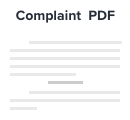-
Saint Lawrence Communications LLC v. AT&T Mobility LLC et al DC
- 2:17-cv-00536
- E.D. Tex.
- Judge: Rodney Gilstrap
- Filed: 07/13/2017
- Closed: 08/08/2018
- Latest Docket Entry: 08/08/2018
- PACER
- Docket updated daily
1
Plaintiff
2
Defendants
0
Accused
Products
5
Patents-in-Suit
925
Days in
Litigation
-
Saint Lawrence Communications LLC v. AT&T Mobility LLC et al DC
- 2:17-cv-00536
- E.D. Tex.
- Judge: Rodney Gilstrap
- Filed: 07/13/2017
- Closed: 08/08/2018
- Latest Docket Entry: 08/08/2018
- PACER
- Docket updated daily

Complaint Unavailable
Cause of Action
Willful Patent Infringement
Market Sector
Mobile Communications and Devices
Assigned Judge
- Patent Information